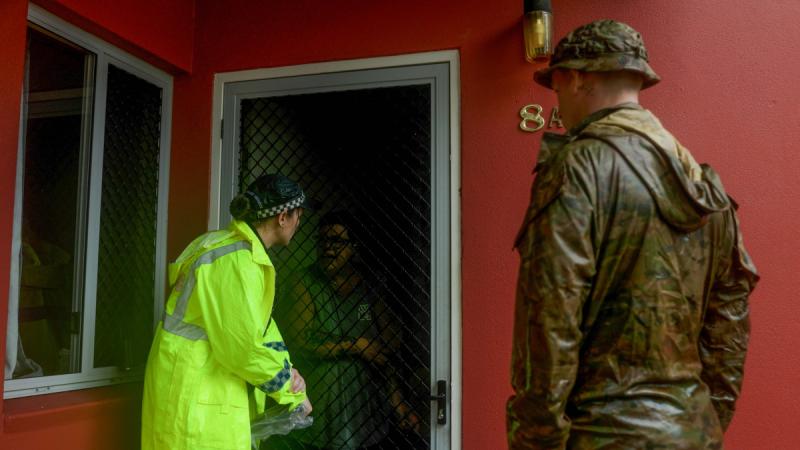As residents in Far North Queensland braced for flooding in the wake of heavy rainfall and damaging winds, Army personnel from Townsville’s 3rd Brigade, Lavarack Barracks, supported the Queensland Police Service (QPS) with door-knocking throughout at-risk areas.
Following a request for Defence Assistance to the Civil Community (DACC), soldiers and supporting liaison officers from the 3rd Battalion, the Royal Australian Regiment (3RAR), began the task on February 1.
QPS officers, soldiers and emergency services personnel waded through rising water to visit thousands of at-risk residences, identifying vulnerable people who needed assistance, and encouraging residents to leave before conditions worsened.
Commander 3rd Brigade, Brigadier Ben McLennan, said it was a privilege to be part of the Townsville community and to provide support to the local emergency services.
“We’re fortunate to live and work in Australia’s premier garrison city, and this type of event emphasises the cohesion and resilience of this community, as well as the great work of our local emergency services,” Brigadier McLennan said.
He thanked his soldiers for volunteering to help.
“We’ve had more soldiers volunteer to help than we need and that is a testament to their willingness to get out there and get their socks wet to help the community,” Brigadier McLennan said.
“In our darkest moments, the best of humanity comes out, and you can really see that in the Townsville community during times like this.”
The Ross River Dam reached 155.72 per cent capacity at midday on February 2, and was set to continue rising, prompting evacuation warnings for residents across the region.
This 1967 U.S. Navy documentary looks at the sailors operating on the rivers and in the skies above Vietnam. The Mekong Delta was a hot zone in the war against well organized Viet Cong insurgents, immortalized by the film “Apocalypse Now.” This beautifully photographed film is the real thing — a “slice of life” documentary showing daily operations aboard the Harnett County and on river patrols by air & water. The USS Harnett County (LST-821) served as a floating base in the China Sea for PBR and helicopter patrol operations in the Mekong Delta during the Vietnam War. “REEL HISTORY” will cover battles… military personalities… stories of survival and heroism… and broader stories of campaigns and conflicts produced by or for the U.S. Military. All Original footage. The Real History…
Randwick council cleaners remove antisemitic graffiti from houses in Sydney’s eastern suburbs. Credit: Edwina Pickles
Prime Minister Anthony Albanese is under intense scrutiny as the opposition, led by Peter Dutton, demands answers on whether the Prime Minister was deliberately kept in the dark about the shocking discovery of an explosives-laden caravan—a plot police suspect was intended to target a Sydney synagogue. This alarming development has sent shockwaves through the nation, raising serious concerns about the government’s response to rising threats against the Jewish community.
Opposition Leader Peter Dutton has strongly suggested that police may have withheld critical information from the Prime Minister’s office due to concerns over media leaks. If true, this represents a damning indictment of the government’s perceived inability to handle sensitive security matters effectively. Dutton’s concerns highlight a growing lack of trust in the Albanese administration’s ability to safeguard Australians against escalating threats of antisemitic terrorism.
While Detective Superintendent Darren Newman, who leads NSW Police’s Strike Force Pearl, declined to comment on Dutton’s claims, the broader situation remains deeply concerning. Authorities are investigating a series of disturbing incidents that took place in Sydney’s east on Saturday night, including the discovery of a Mazda with a jerry can and cartons of eggs in Rose Bay, the egging of five women near Bondi Beach, and antisemitic graffiti in Kingsford and Randwick. Although police have stated these events are not directly linked to the caravan plot, they may represent copycat attacks, further fuelling tensions within the community.
The NSW Jewish Board of Deputies has called for urgent reforms, demanding harsher penalties for crimes that specifically target the Jewish population. These attacks are not mere acts of vandalism or mischief—they are calculated attempts to intimidate, terrorise, and destabilise Sydney’s social fabric. Yet, the Albanese government’s response has been underwhelming at best, showing a disturbing lack of urgency in addressing the growing wave of antisemitic threats.
Peter Dutton is right to hold the Prime Minister accountable. Australia cannot afford a government that dithers while extremists seek to instil fear in Jewish communities. Stronger punishments must be introduced, and law enforcement agencies must be given the necessary support to stamp out these threats before they escalate further. The safety of Australian citizens—particularly those targeted by hate-fuelled terrorism—must be the government’s top priority.
Albanese must break his silence and take decisive action. Anything less would be a dereliction of duty.
DEFENCE MEDIA RELEASE
Defence Accepts First Arafura Class Offshore Patrol Vessel for Test and Evaluation
Defence has accepted the first Arafura class Offshore Patrol Vessel, NUSHIP Arafura, for further test and evaluation ahead of its formal delivery to the Royal Australian Navy.
NUSHIP Arafura is the first of class vessel delivered under Project SEA 1180 and has been built by Luerssen Australia at the Osborne Naval Shipyard in South Australia. This project will deliver six Arafura class Offshore Patrol Vessels (OPVs) to the Navy, enhancing Australia’s maritime security capabilities.
The first two OPVs have been constructed at Osborne, with the remaining four currently under construction at Henderson in Western Australia. The Arafura class vessels will form part of the Navy’s Minor War Vessel Fleet, supporting civil maritime security operations and strengthening regional engagement across the Southwest Pacific and maritime Southeast Asia.
Deputy Secretary Naval Shipbuilding and Sustainment, Mr Jim McDowell, highlighted the significance of this milestone in Australia’s naval shipbuilding program.
“The delivery of the first Arafura class Offshore Patrol Vessel to Defence is a major step forward in the Australian Government’s commitment to enhancing the Australian Defence Force’s capability through local shipbuilding,” Mr McDowell said.
“This milestone underscores Defence’s dedication to successfully managing complex projects to deliver critical capabilities, built right here in Australia.”
NUSHIP Arafura will now proceed to its homeport at HMAS Stirling in Western Australia, where it will undergo final preparations ahead of its commissioning into the Royal Australian Navy fleet later this year.
ED: From my inbox – thank Ralf Schwer
By Mark Giaconia – Quora
My father is a Vietnam veteran with three purple hearts and a silver star. He is the toughest person I have ever known.
This is his story
My father volunteered to join the Army in 1968, he did not get drafted. He worked in a saw mill as a teenager, and grew up the son of poor Italian immigrants. He was raised in a quanset hut in Connecticut (yes there are poor people in Connecticut) until my Grandfather had enough money to build a house by hand with a couple of buddies in the late 50s or early 60s.
Once in Vietnam my father was wounded three times, but on the first two he never left the country even though he could have.
The third time defines toughness.
My father’s platoon, as part of a company operation, walked directly into a VC Base camp in southern Vietnam (my father was a grunt in the 2/60th of the 9th Infantry Division) roughly during the Tet offensive.
A VC Machine gunner fired on him from a concealed position that was no more than 15 feet away. One round instantly almost ripped his foot completely off, and it dangled mainly by the Achilles tendon. Another round destroyed my dad’s hand, and also another rendered his M16 inoperable because the bullet went through the bolt and destroyed the action. When he fell down from the impact, and somehow crawled a bit, he somehow escaped the wrath of that particular machine gun nest, but then he saw another in front of him, but this new VC machine gunner didn’t see him yet and was firing at others in his unit.
At this point, men were screaming in pain for help everywhere around my father, and the pain in his hand and leg grew, and he was weaponless. He had to get away from this new machine gun without it seeing him, and the only way to go was over the rice paddy dike that was about 10 feet behind him.
As soon as he moved one inch to begin his escape, that machine gun swung around on him and opened fire. My father only talks about this moment with me, and he only talked about it once or twice ever, and he literally breaks down with the shakes at the recollection.
As the bullets spewed at him, he jumped up, standing on the end of his ankle bone on his right leg, since the foot was flopping, and did the best he could to basically run and dive over the dike. In the process he was hit three more times. Once in the underside of his arm, shredding his bicep and part of his tricep, again in the shoulder, and another in the underside of his Jaw/face.
He landed in the mud on the other side of the dike and could feel his jaw swinging on his face, and his arm was pumping blood like a garden hose. He didn’t even feel the one in the shoulder at all.
His tongue and face began to swell so badly that he couldn’t breathe, so he somehow cut himself a trachea with a jackknife using his one good hand. He also packed his arm with mud to stop the bleeding because those Army bandages were totally useless.
the trachea didn’t work perfectly, so he occasionally had to grab his swollen tongue and pull it down so he could breathe a bit more, and he did this intermittently as he put his bayonet between his thighs, and hooked the pin on his grenades on the blade so he could pull the pin with his one hand and throw the grenades. He said he couldn’t talk, but he was trying to yell at “the sons of bitches” the whole time.
He crawled along the dike and got weapons from the dead, or from those who were so wounded they couldn’t function, and continuously fired them with one hand to hold the enemy back (they had started to advance through their kill zone basically). Multiple evac helicopters were shot down during this time, and eventually my father had lost so much blood he started to fade… he was going to die.
Out of nowhere, a huge black man from Texas named Cleaver, scooped up my father, and carried him to a chopper that had finally been able to land somewhere. This man barely knew my dad, given that he was black and this was 1968 so the platoon was kind of self-segregated. Cleaver saved his life, and I wouldn’t be here without him – today he would have gotten the medal of honor, but then he didn’t get a damn thing. This is a whole ‘nother story.
Cleaver ran through a hail of bullets, and threw my dad in a huey on top of other bodies, and that’s the last thing my father remembers until he woke up in a hospital in, IIRC, Okinawa (could be wrong on that).
Fast forward two years and hundreds of operations on his jaw, arm, hand, and ankle, my dad is released from the Army with a 300$ pension (they messed up his disability rate, but he “never expected to get any money anyway because he had volunteered”). He is missing a finger and has limited use of his right hand, and his ankle is fused together with a tangle of screws, and his jaw was bone graffed back together but was wired shut for almost a year.
He got a job in a factory in Deep River, CT, marries my mom, and has kids (me). In the late 70s and early 80s he still gets multiple operations, and I remember him shooting an M1 carbine out the window due to insane flashbacks (we lived in the middle of nowhere). He worked in this factory for 30 years.
Then something else happens to him. He somehow becomes deathly allergic to bee stings. He has three near death experiences with this, barely surviving one occasion. He always says, “I can take 5 machine gun rounds, but a goddamn bee sting is what’s gonna kill me… WTF”
He coached our school soccer and baseball teams for years from crutches, or a wheelchair, or both, and every year he coached we won the CT shoreline championships (soccer).
Then another thing happened. One day my grandfather and him were cutting wood in the forest, and a dead tree fell on him. Imagine the luck. You’re in the woods, and a dead tree decides to fall, right on where you are squatted cutting another tree. My grandfather yelled to him just in time for him to turn, and that turn allowed the tree to only graze him. He still was unconscious for several days in the hospital, had a massive concussion and other damage, but somehow lived.
He was also electrocuted once as well… but this post is getting too long already so I’ll stop there.
My dad is now 73, and his wounds don’t get any better, especially the mental ones. He met Cleaver later in life, and they were both so overwhelmed that they really didn’t know what to say, and then they never talked again, because it was just too emotional. He was awarded a Silver Star for his actions that day, but he really doesn’t give a shit about that medal.
I also forgot to mention that he is an amazing father, and one of the kindest people you would ever know. Half of what I’ve done, and do, in my life was/is just a pathetic attempt to impress him.
Now if that ain’t tough, I don’t know WTF is. Also, think about Cleaver, also tough AF.
Popular Mechanics
During World War II, American submarines in the Pacific demonstrated unparalleled stealth, slipping past enemy patrols, launching surprise attacks, and crippling Japanese supply lines. Over the decades, submarine detection technology has advanced significantly, incorporating passive and active sonar, surface-scanning radar, and magnetic anomaly detectors. However, submarines have also become stealthier in response. Yet, a fundamental navigational limitation still forces modern submarines to break their cover: the need to surface periodically to recalibrate their position using GPS.
Submarines rely on inertial navigation systems (INS) to determine their location, velocity, and orientation. However, these systems suffer from integration drift, where small measurement errors accumulate over time, leading to significant deviations from the actual position. To correct these errors, submarines must briefly expose themselves near the surface to receive updated positioning data from GPS satellites. This vulnerability not only risks detection but could be rendered ineffective if adversaries jam or disable GPS signals.
To overcome this issue, the U.S. Navy is exploring quantum navigation technology, which promises to eliminate the need for GPS-dependent recalibration. Quantum sensors could revolutionise submarine warfare by improving detection range, refining navigation precision, and enhancing onboard computing power. The real challenge, however, is deploying this technology before adversaries like China develop their own quantum-based anti-submarine detection systems.
Traditionally, submarines maintain stealth through acoustic silence, deep-water concealment, and electromagnetic signature reduction. However, the advent of quantum sensor technology could compromise these methods. Two key quantum phenomena—quantum entanglement and quantum superposition—could significantly enhance submarine detection capabilities. Entanglement enables sensors to correlate data over vast distances, while superposition allows quantum computers to process massive amounts of data simultaneously, vastly improving detection and computational efficiency.
Currently, detection methods such as gravimeters and magnetometers are limited in range, typically effective only within several hundred feet. However, quantum-enhanced versions of these devices could extend detection capabilities to several miles. Quantum gravimeters, already used in scientific fields like geology and climate research, measure gravitational variations with extreme precision. Adapted for submarine warfare, these sensors could map subtle changes in Earth’s gravitational field, effectively detecting submerged vessels without active sonar.
Quantum magnetometers, such as the Superconducting Quantum Interference Device (SQUID), offer another powerful tool. Conventional magnetometers on anti-submarine aircraft have an effective range of about half a mile. SQUID-based sensors, however, could increase this range to nearly four miles, dramatically improving the ability to detect submarines from the air. Such advances could make it exceedingly difficult for submarines to remain undetected in contested waters.
Moreover, quantum computing could facilitate autonomous submarine operations, enabling unmanned underwater vehicles (UUVs) to execute complex combat missions without human intervention. The first large autonomous XLUUV-class submarines are already being integrated into the U.S. Navy for specialized operations, and quantum-enhanced AI could further expand their capabilities.
China currently leads in quantum research, with estimated government investments exceeding $15 billion, compared to the U.S.’s $3.8 billion. While the Pentagon acknowledges the strategic importance of quantum technology, funding remains inconsistent. If the U.S. fails to close the gap, adversaries may gain a decisive edge in undersea warfare. The race for quantum supremacy will determine the future of submarine stealth and detection, shaping naval warfare for decades to come.
The Australian Government has announced a significant investment of up to $650 million to acquire additional stocks of the Advanced Anti-Radiation Guided Missile-Extended Range (AARGM-ER). These advanced missiles are designed to detect, attack, and neutralise enemy radar systems, bolstering the Australian Defence Force’s (ADF) operational capability and deterrence power.
This investment aims to enhance the ADF’s warstock and strengthen Australia’s ability to deter potential adversaries, ensuring national security and the safety of its citizens. The latest funding supplements the $431 million previously allocated for AARGM-ER missiles in August 2023, further demonstrating the Government’s commitment to strengthening Australia’s long-range strike capabilities.
The supersonic, air-launched AARGM-ER missiles will be integrated into the Royal Australian Air Force’s (RAAF) F/A-18F Super Hornet and EA-18G Growler aircraft. Additionally, plans are in place to equip these cutting-edge weapons onto Australia’s F-35A Lightning II fighter jets in the future, enhancing their operational effectiveness and adaptability.
The procurement of these missiles will be conducted through the United States Government’s Foreign Military Sales (FMS) process, reflecting the strong defence partnership between Australia and the United States. This collaboration underscores the deep strategic alliance and ongoing military cooperation between the two nations.
This initiative forms part of the Albanese Government’s broader commitment to investing in Guided Weapons and Explosive Ordnance, aligning with the priorities set out in the 2024 National Defence Strategy. Strengthening Australia’s defence capabilities through advanced missile technology is a crucial step in ensuring the nation’s security and maintaining regional stability.
The acquisition of AARGM-ER missiles will significantly improve the range, survivability, and effectiveness of the RAAF’s strike capabilities. By integrating these world-class systems into Australia’s air combat fleet, the Government is reinforcing its commitment to modernizing defence assets and ensuring the ADF remains equipped with the latest technological advancements.
Through continued investment in cutting-edge defence systems and sustained collaboration with key allies, Australia is taking decisive steps to secure its national interests and maintain a robust deterrent against potential threats. The acquisition of these advanced missiles highlights the Government’s strategic approach to enhancing military readiness and safeguarding the nation’s future security.
Defence personnel awarded Australia Day honours and awards
Access the list of recipients available here: Australia Day 2025 Honours List | Governor-General of the Commonwealth of Australia
The Krakow Post
Norwegian authorities have seized a Russian-crewed vessel, the Silver Dania, on suspicion of causing “serious damage” to a fibre cable in the Baltic Sea between Latvia and Sweden. The ship was brought into the port of Tromsø, Norway, for investigation on Friday, January 31, 2025.
The Seizure
Norwegian police located the Silver Dania on Thursday evening.
- The ship was escorted into the port of Tromsø on Friday morning.
- Although the ship is Norwegian-registered and Norwegian-owned, its crew consists entirely of Russian nationals.
The Investigation
Authorities are conducting a thorough investigation into the ship’s potential involvement in the cable damage.
- Police are searching the vessel, conducting interviews, and securing evidence.
- The Silver Dania was reportedly sailing between St. Petersburg and Murmansk in Russia when the incident occurred.
Owner’s Statement
The Silver Sea shipping group, owners of the Silver Dania, have denied any involvement in the damage to the fibre cable.
- Tormod Fossmark, CEO of Silver Group, stated that authorities had not found any concrete links connecting the ship to the damaged cable.
- Despite the investigation, the crew has been allowed to prepare the vessel to set sail again on Friday night.
Previous Incidents
The Silver Dania seizure is part of a broader pattern of similar incidents.
- Just last week, the Swedish Public Prosecutor’s Office boarded another ship suspected of damaging a communications cable between Sweden and Latvia.
- Such incidents have been increasing since late 2022, leading to growing concerns over potential sabotage.
Russia’s Response
Russia has denied any allegations of involvement in underwater cable sabotage.
- The Russian Embassy in London dismissed the accusations, instead claiming that NATO is using the issue as a pretext for increasing its naval and air force presence in the region.
As investigations continue, authorities in Norway and other Baltic nations remain on high alert, closely monitoring maritime activities that could threaten critical infrastructure.










